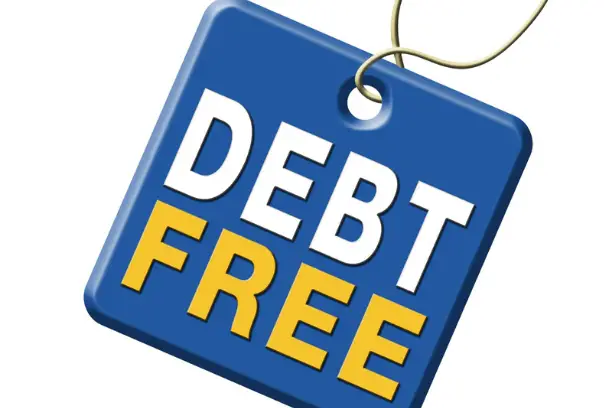Debt is a pervasive issue in modern society, affecting people of all ages and backgrounds. It can be easy to fall into the trap of using credit cards, loans, or other forms of financial commitments to make ends meet or achieve financial goals. However, the burden of debt can take a significant toll on one’s well-being, leading to stress, anxiety, and feelings of hopelessness.
Being debt-free, on the other hand, can bring a sense of financial security and peace of mind, allowing individuals to pursue their dreams and passions without being held back by financial constraints. Being debt-free means having the freedom to make decisions without being tied down by debt payments. It means having the ability to pursue your dreams, save for the future, and live life on your own terms.
In this blog post, we will explore the nine habits of debt-free people that you can adopt to achieve financial independence. These habits range from living within your means to being patient and disciplined. Incorporating these habits into your financial routine can help you take control of your money, achieve your financial goals, and live a life free of debt.
So, whether you are just starting your journey towards financial independence or looking to improve your financial situation, this blog post will provide you with actionable steps to become debt-free. Let’s dive in!
1. Living within your means
One of the most important habits of debt-free people is living within their means. This means that they only spend what they can afford and do not rely on credit cards or loans to make ends meet.
Here are two key ways to live within your means:
I) Budgeting
The first step towards living within your means is creating a budget. The purpose of a budget is to help you understand where your money is going by outlining your income and expenses.
Begin crafting your budget by compiling a comprehensive list of all your income streams, such as your salary, bonuses, and any other forms of revenue. Then, itemize all of your expenses, including rent, utilities, groceries, and any other bills. Be sure to also include expenses that are not monthly, such as car repairs and medical expenses.
Once you have a clear picture of your income and expenses, you can identify areas where you can cut back and make adjustments to ensure you are living within your means.
I) Avoiding impulsive purchases
Another important aspect of living within your means is avoiding impulsive purchases. This means resisting the temptation to buy things you don’t need or can’t afford.
One way to avoid impulsive purchases is to create a list before you go shopping and stick to it. Another way is to wait before making a purchase. Before making a purchase, give yourself a day or two to consider whether you actually need the item. By avoiding impulsive purchases, you can ensure that you are only spending money on things that are truly important and necessary.
Living within your means may require some discipline and sacrifice, but it is a critical habit for achieving financial independence and becoming debt-free. By creating a budget and avoiding impulsive purchases, you can ensure that you are only spending money on the things you truly need and can afford.
2. Setting Financial Goals
Another habit of debt-free people is setting financial goals. Having well-defined financial goals helps to keep you motivated and on track as you strive towards reaching your desired financial objectives.
Here are two key aspects of setting financial goals:
I) Short-term goals
Short-term financial goals are those that you can achieve within a year or less. Examples of short-term goals might include paying off a credit card or student loan, building an emergency fund, or saving up for a vacation.
Short-term goals should be specific, measurable, and achievable, and you should create a plan to achieve them. By setting and achieving short-term goals, you can build momentum towards your long-term financial goals.
II) Long-term goals
Long-term financial goals are those that you want to achieve in five years or more. Long-term goals could include starting a business, purchasing a home, or retiring comfortably..
Long-term goals should be specific, measurable, achievable, and relevant to your overall financial plan. You should also create a plan to achieve your long-term goals, including breaking them down into smaller, more manageable milestones.
3. Steering Clear of Credit Card Debt
Accruing credit card debt can pose a significant hindrance to attaining financial independence and liberating yourself from debt. Debt-free people understand the importance of avoiding credit card debt and take steps to ensure that they do not accumulate large credit card balances.
Here are two key ways to avoid credit card debt:
I) Paying credit card bills on time
Paying your credit card bills on time each and every time is one of the best methods to prevent credit card debt. Late payments can result in fees and penalties that can quickly add up, making it harder to pay off your balance.
To avoid late payments, set up automatic payments or reminders to ensure that you never miss a payment.
II) Reducing the number of credit cards owned
Another way to avoid credit card debt is to limit the number of credit cards you own. The more credit cards you have, the easier it is to overspend and accumulate debt. It can be helpful to only have one or two credit cards that you use for specific purposes, such as earning rewards or building credit.
By limiting the number of credit cards you own, you can reduce your temptation to overspend and avoid accumulating unnecessary debt.
Avoiding credit card debt requires discipline and a commitment to living within your means. By paying your credit card bills on time and limiting the number of credit cards you own, you can avoid accumulating credit card debt and make progress towards financial independence and debt-free living. Remember that credit cards should be used as a tool to help you achieve your financial goals, not as a way to spend beyond your means.
4. Having an Emergency Fund
One of the key habits of debt-free people is having an emergency fund. An emergency fund is a stash of money that you put away specifically for unforeseen expenses, such as a job loss, medical emergency, or vehicle repair.
I) The importance of having an emergency fund
Having an emergency fund is important because it can help you avoid accumulating debt in the event of an unexpected expense. If you don’t have an emergency fund, you could have to use credit cards or loans to pay for unforeseen costs, which can quickly put you in debt..
By having an emergency fund, you can cover unexpected expenses without going into debt and maintain your progress towards financial independence and debt-free living.
II) How much money to save for an emergency fund
The necessary amount of money to save for an emergency fund varies according to your personal situation. Typically, it is recommended to save an amount equal to three to six months of your living expenses. However, if you have a secure job and minimal expenses, saving three months’ worth of expenses may be sufficient.
However, if you have a more unstable job or higher expenses, you may want to save up to six months’ worth of expenses. Keep in mind that the goal of an emergency fund is to cover unexpected expenses, so you should consider your specific situation when determining how much to save.
Having an emergency fund can provide peace of mind and help you avoid debt in the event of an unexpected expense. Make sure to keep your emergency fund in a separate account, such as a high-yield savings account, to ensure that it is easily accessible when needed. By having an emergency fund, you can protect your financial stability and stay on track towards financial independence and debt-free living.
5. Prioritizing Savings
Another habit of debt-free people is prioritizing savings. Debt-free people understand the importance of saving money and make it a priority in their budget.
Here are two key ways to prioritize savings:
I) Creating a savings plan
One of the best ways to prioritize savings is to create a savings plan. This includes defining precise savings objectives, such as saving for a home down payment or establishing an emergency fund, and calculating the monthly savings amount required to achieve those targets.
By creating a savings plan, you can make savings a priority and ensure that you are making progress towards your financial goals.
II) Making savings a priority
Another way to prioritize savings is to make it a priority in your budget. This means allocating a specific amount of money towards savings each month, before you pay for other expenses. One popular method for prioritizing savings is the “pay yourself first” approach, where you automatically transfer a portion of your income into a savings account before paying for other expenses. By making savings a priority, you can ensure that you are consistently saving money and making progress towards your financial goals.
Prioritizing savings requires discipline and a commitment to your financial goals. By creating a savings plan and making savings a priority in your budget, you can ensure that you are consistently saving money and making progress towards financial independence and debt-free living.
Remember that savings should be a long-term goal, and that small contributions over time can add up to significant savings. By prioritizing savings, you can build a strong financial foundation and achieve financial stability.
6. Avoiding Consumer Debt
Another habit of debt-free people is avoiding consumer debt. Consumer debt is debt that is used to purchase consumer goods or services, such as credit card debt or personal loans.
I) The difference between consumer debt and investment debt
It’s important to understand the difference between consumer debt and investment debt. Investment debt is debt that is used to purchase assets that appreciate in value, such as a mortgage or business loan. Consumer debt, on the other hand, is used to purchase goods or services that typically lose value over time, such as clothing or vacations.
Debt-free people prioritize investment debt over consumer debt because it can help them build wealth over time, while consumer debt can lead to financial stress and setbacks.
II) How to avoid consumer debt
There are several ways to avoid consumer debt, such as living within your means, avoiding impulsive purchases, and prioritizing savings.
By living within your means, you can ensure that you are not overspending on unnecessary items and can avoid accumulating consumer debt. Avoiding impulsive purchases helps to prevent unnecessary spending and can help you stay on track towards your financial goals. Prioritizing savings helps you avoid consumer debt by providing a financial cushion in the event of unexpected expenses.
It’s important to note that consumer debt is not always avoidable, especially in cases of emergencies or unexpected expenses. However, by prioritizing investment debt over consumer debt and taking steps to avoid unnecessary spending, you can minimize the impact of consumer debt on your finances.
Debt-free people understand the importance of avoiding consumer debt and make it a priority in their financial planning. By following this habit, you can build a strong financial foundation and achieve financial independence and debt-free living.
7. Living a Frugal Lifestyle
Living a frugal lifestyle is another habit of debt-free people. Frugality involves being mindful of your spending and making intentional choices to save money.
I) The importance of frugality
Living a frugal lifestyle can have a significant impact on your financial health. By being mindful of your spending, you can avoid unnecessary expenses and save money for future goals. Frugality can also help you avoid debt and financial stress by keeping your expenses in check.
II) How to live a frugal lifestyle
To live a frugal life, there are multiple strategies one can take advantage of, including:
- Creating a budget: Creating a budget can help you track your spending and identify areas where you can cut back. By creating a budget, you can make intentional choices about where to allocate your money and avoid overspending.
- Shopping smart: Shopping smart means looking for deals and discounts on the things you need. This can include using coupons, shopping during sales, and comparing prices before making a purchase.
- Minimizing expenses: Minimizing expenses means cutting back on unnecessary expenses and finding ways to save money on the things you need. This can include things like meal planning to save money on groceries, reducing energy usage to lower utility bills, and using public transportation or carpooling instead of driving alone.
Living a frugal lifestyle requires discipline and a willingness to make intentional choices about your spending. Debt-free people understand the importance of living frugally and make it a priority in their daily lives.
By adopting a frugal lifestyle, you can avoid debt and achieve financial independence and debt-free living.
8. Avoiding Lifestyle Inflation
Another habit of debt-free people is avoiding lifestyle inflation. Lifestyle inflation refers to the tendency to increase spending as income increases.
I)The dangers of lifestyle inflation
Lifestyle inflation can be a major obstacle to achieving financial independence and debt-free living. As income increases, it can be tempting to upgrade your lifestyle and spend more on things like housing, transportation, and entertainment. However, this type of spending can quickly spiral out of control and lead to debt and financial stress.
II) How to avoid lifestyle inflation
To avoid lifestyle inflation, there are a few practical steps you can take:
- Creating a budget: Creating a budget can assist you in monitoring your expenses and pinpointing opportunities for reducing them. By creating a budget, you can make intentional choices about where to allocate your money and avoid overspending on unnecessary expenses.
- Prioritizing savings: Prioritizing savings can help you avoid lifestyle inflation by putting money towards long-term goals instead of short-term wants. By saving for things like retirement, a down payment on a house, or a child’s education, you can avoid the temptation to overspend on things that won’t bring lasting value to your life.
- Being mindful of your spending: Being mindful of your spending means being intentional about the choices you make with your money. Before making a purchase, ask yourself if it aligns with your values and long-term goals. If it doesn’t, consider finding a more cost-effective alternative or foregoing the purchase altogether.
Debt-free people understand the dangers of lifestyle inflation and take steps to avoid it. By being intentional about your spending and prioritizing long-term goals over short-term wants, you can avoid lifestyle inflation and achieve financial independence and debt-free living.
9. Being Patient and Disciplined
The final habit of debt-free people is being patient and disciplined. Achieving financial independence and debt-free living requires a long-term perspective and the discipline to make difficult choices.
I) The importance of patience and discipline
Achieving financial independence and debt-free living is a journey that requires patience and discipline. It can take years of hard work and sacrifice to achieve your goals, and there will inevitably be setbacks along the way. By staying focused on your goals and remaining disciplined in your spending and saving habits, you can overcome these obstacles and achieve success.
II) How to be patient and disciplined
There are several ways to cultivate patience and discipline on your journey towards achieving financial independence and living a debt-free life. Here are a few strategies that can help you stay focused and committed to your goals:
- Setting realistic goals: Defining attainable goals can boost your drive and concentration towards achieving your long-term objectives. By breaking your goals down into manageable steps, you can make steady progress over time and avoid becoming overwhelmed.
- Celebrating small wins: Taking pleasure in minor victories along the way helps keep you inspired and retain a positive outlook. Whether it’s paying off a credit card or hitting a savings milestone, taking time to acknowledge your progress can help you stay on track.
- Staying committed to your plan: Staying committed to your plan means sticking to your budget and savings goals even when it’s difficult. It means resisting the temptation to overspend or take on debt in order to achieve short-term wants.
FINAL THOUGHTS ON HABITS OF DEBT-FREE PEOPLE
In conclusion, achieving financial independence and debt-free living is possible with the right habits and mindset. By adopting the habits of debt-free people, you can take control of your finances and build a strong foundation for your future.
Here are the nine habits of debt-free people that we covered:
- Live within your means
- Set financial goals
- Avoid credit card debt
- Have an emergency fund
- Prioritize savings
- Avoid consumer debt
- Live a frugal lifestyle
- Avoid lifestyle inflation
- Be patient and disciplined
Each of these habits is important in its own way, but they all work together to help you achieve financial independence and debt-free living. By living within your means, setting financial goals, avoiding credit card debt, having an emergency fund, prioritizing savings, avoiding consumer debt, living a frugal lifestyle, avoiding lifestyle inflation, and being patient and disciplined, you can build a strong financial foundation that will serve you well for years to come.
So, if you’re ready to take control of your finances and build a better future, start implementing these habits today. It won’t be easy, but with persistence and discipline, you can achieve your goals and enjoy the many benefits of being debt-free, such as reduced stress, more financial freedom, and the ability to pursue your dreams. Good luck!🍀✨
Read More:
- 9 Bad Money Habits That Are Keeping You Poor
- 9 Frugal Tips to Live Below Your Means
- The One Habit You Need to Save Money
- 10 Things You Need to Stop Buying to Save Money Fast
- 10 Simple Money-Saving Tips for Beginners
- 21 Passive Income Ideas to Make Money Online in 2023
- Side Hustle Ideas Mega List: 101 Ways to Make Extra Money at Home






